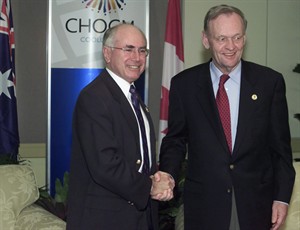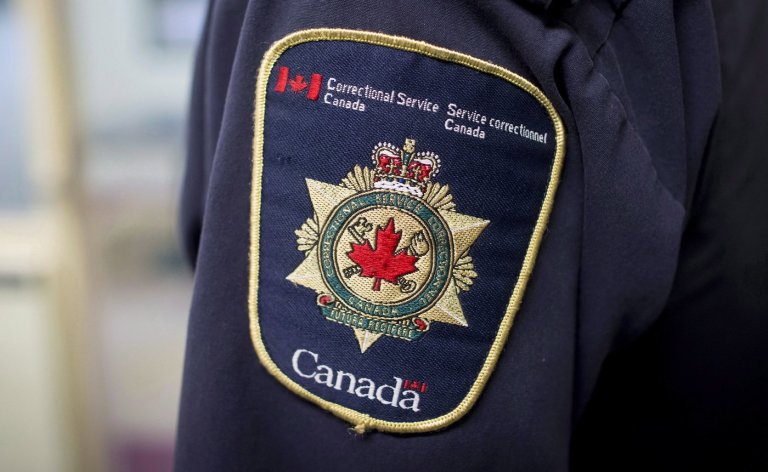
Australia respected Chretien decision not to join Iraq coalition: Howard
OTTAWA – The United States may have been upset and disappointed by Canada’s refusal 10 years ago to join its coalition to invade Saddam Hussein’s Iraq.
But Down Under, no one was surprised when then-prime minister Jean Chretien decided against sending Canadian troops to join those from the U.S., Britain and Australia.
Former Australian prime minister John Howard says he understood Chretien’s aversion to sending his country to war without a United Nations Security Council resolution.
And although Howard didn’t agree, he respected the decision.
Howard offered that insight in a recent interview as the first decade since the U.S.- and British-led invasion of Iraq passed into history Wednesday.
Howard’s view differs sharply from the American reaction, which the then-U.S. envoy, Paul Cellucci, said days after the invasion amounted to “disappointment and upset that Canada is not there for us now.”
As for Howard — who contributed Australian special forces and fighter jets to the invasion — there were no hard feelings when it came to Canada.
“As far as Canada was concerned, I knew — given Jean Chretien’s attitude — that Canada was not going to join,” Howard told The Canadian Press in a recent interview in Ottawa. “I respected that decision. That was his right. That was his call.
“I didn’t have arguments with him about it.”
A decade later, the decisions taken by world leaders on the Iraq question have had political ramifications.
For Chretien, it elevated his battered legacy in Quebec, the most anti-war province, as he prepared to end his four-decade political career.
For former U.S. president George W. Bush and British prime minister Tony Blair, the citizens of their own countries have judged them harshly because of the high death toll. Their longtime political opponents now in hold power in their respective countries.
Almost 4,500 U.S. soldiers were killed in Iraq and 30,000 wounded. More than 100,000 Iraqis were killed.
Australia got in — and out — of Iraq remarkably unscathed. No Australians were killed in the initial invasion. In the years to come, a total of three Australian military personnel would lose their lives in Iraq.
“We were very fortunate,” Howard said. “We’ve taken some casualties in Afghanistan, but nothing like the casualties that Canada has taken. Canada has taken very high casualties in Afghanistan, very high.”
Howard said he knew Chretien well and enjoyed his company, even though the Canadian was further left on the political spectrum.
“We talked very frankly,”Howard recalled “He had a different view.
“He had a view that you shouldn’t do anything except with the authority of the Security Council. And that’s a view that a lot of people, more on the centre-left, hold now.”
But Howard said if you wait for the Security Council to act on important matters, “you wait interminably” because of the veto powers of the permanent members.
That view of the UN fits hand-in-glove with the one held by the current Conservative government under Prime Minister Stephen Harper.
Harper and his cabinet ministers have snubbed and attacked the UN over the years. They have criticized the Security Council’s inability to deal with the Syrian crisis.
In 2003, the American decision on Iraq had one very notable, vocal supporter in Canada — Harper, then the leader of the opposition Canadian Alliance.
Harper told the House of Commons that Canada should have stood with its American ally.
In October 2008, Harper backed down from that when pressed during a televised leaders’ debate during the federal election campaign.
“It was absolutely an error,” Harper said. “It’s obviously clear the evaluation of weapons of mass destruction proved not to be correct.”
Harper and Howard, kindred political spirits, are good friends.
Harper drew lessons from Howard’s record of three majority election victories, prior to winning power himself in 2006. Later that year, Howard became the first foreign leader to call on the newly elected Conservative prime minister in Ottawa.
Almost two weeks ago, Harper and Howard had a private lunch in Ottawa.
Howard said he and Harper have discussed Iraq “in a general way,” but he wouldn’t divulge specifics.
Instead, he shifted the interview back to Chretien.
“We had a friendly relationship, although we had different views on a number of issues — not a lot of issues. When you get to head of state, head of government, the differences dissolve a bit. I enjoyed working with him,” said Howard.
“But philosophically, I’m obviously much closer to Harper.”
To this day, Howard said he has no regrets about contributing to the Iraq coalition, even though the main justification — relieving Saddam of his supposed arsenal of weapons of mass destruction — has been discredited.
“The intelligence was not doctored. It was not made up. It wasn’t based on lies. It didn’t turn out to be accurate. But intelligence can never be there beyond a reasonable doubt. If you wait for perfect proof, you get another Pearl Harbour don’t you?”
Howard said he doesn’t know how history will judge him, but he thinks it was been too hard on Bush.
“I thought Bush was courageous. I never felt Bush got the credit for keeping America free of another attack,” he said.
Howard was in Washington when the 9-11 attacks occurred. On Sept. 10, 2001, he met Bush.
“When this attack took place, the thing that preoccupied everybody was when and where the next attack would take place,” Howard said.
“It was in that context that Bush’s attention was focused.”
Join the Conversation!
Want to share your thoughts, add context, or connect with others in your community? Create a free account to comment on stories, ask questions, and join meaningful discussions on our new site.














Leave a Reply
You must be logged in to post a comment.